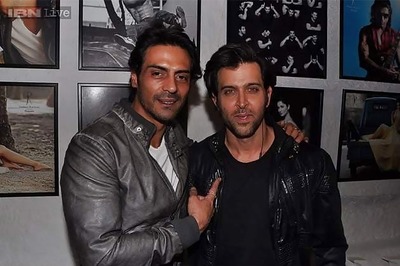
views
Brussels, Belgium: Ordinary Indians still battle corruption in daily lives and think that the Government is doing little to fight the problem, but the silver lining is that that things are improving, slightly.
As many as 39 per cent of ordinary Indians feel that their Governments fight against corruption is not effective, 20 per cent feel that it does not fight at all and 15 per cent that it actually encourages corruption, says a new global survey.
Indians’ perception of corruption reflects a worldwide trend, says the 2006 Global Corruption Barometer of Transparency International, a Berlin-based non-governmental organisation that monitors corruption.
The survey found 69 per cent of ordinary citizens across the world say their government is either ineffective in fighting corruption, does nothing about it or encourages it, while only 22 per cent applaud government’s efforts. Only seven per cent Indians fell their governments fight against corruption is very effective.
The survey was not all grim though: Around 88 per cent of respondents in India said they had not paid bribe in the past 12 months.
Indians do report a substantial reduction in the perceived level of corruption in a number of sectors, like education, the legal system/judiciary, media, legislature, and utilities, but still feel that the majority of sectors are significantly affected by corruption.
In a scale of one (not corrupt at all) to five (extremely corrupt), the police was regarded as the most corrupt with a a scaling of 4.3.
Politics parties followed closely with a scaling of 4.2. Parliament/legislature got a scaling of 3.5 and the business and private sector 3.2. With a scaling of 1.9, the military in the country is regarded as the least corrupt. The media got a scaling of 2.4 and the judiciary/courts 2.8.
Utility services in the country got a scaling of 2.8 and registry/permit services 3.3.
Asked about corruption’s impact, Indians said it had the worst effect on political life and the business environment and then their personal and family life.
PAGE_BREAK
Trends in India are in line with that seen in Argentina, Bulgaria, Chile, Colombia, Croatia, Hong Kong, India, Kosovo, Luxembourg, Macedonia, Pakistan, Panama, Russia, Serbia and Thailand.
Almost one in five North Americans, 15 per cent of Asians and 23 per cent of Latin Americans believe their governments actually encourage corruption, the survey found.
Half of North Americans and 42 per cent of Europeans think their governments' actions are ineffective.
''Corruption has a dramatic effect on the lives of individuals. Its power is enormous,'' said Huguette Labelle, the chairwoman of Transparency International. ''When basic services like electricity are denied to the poor because they cannot afford a small bribe, there is no light in the home, no warmth for the children and no escape for the government from its responsibility to take action.''
Worldwide, police are rated as the most corrupt of civil services, the survey found. In Latin America, one person in three people who came in contact with the police ended up paying a bribe. The judiciary ranked as the third most corrupt institution.
''Citizens rely on the police to protect them, and on judges and the judiciary to punish the criminals,'' Labelle said. ''When these guardians are for sale, some people simply lose faith, others take the law into their own hands.''
The report said corruption in public services was most widespread in Africa where an average bribe of more than $66.50 buys registrations and permits. Bribes averaging $7.90 buy access to basic public utilities such as electricity and water.
In North America and Western Europe, the survey showed concerns about large-scale corruption run high despite little direct experience with bribery for public services. Respondents in North America thought the business environment (85 per cent) and political life (89 per cent) are affected to a moderate or large extent by corruption.
PAGE_BREAK
The 2006 Global Corruption Barometer is the fourth in an annual series and based on a poll of nearly 60,000 people in 62 countries carried out by Gallup International.
Labelle called the findings of the 2006 survey ''a wake-up call for governments that have yet to make fighting corruption a top priority.''
Worldwide, political parties are seen as most affected by corruption, followed by parliaments, legislatures and the business sector.
Religious bodies and non-governmental groups generally rate positively in public perceptions of corruption, said the study that rated different sectors based on people's experiences on a scale from one to five, with one meaning little or no corruption and five equaling wide-scale corruption.
The Global Corruption Barometer 2006 reflects the findings of a survey of 59,661 people in 62 low, middle and high-income countries.
The survey was carried out on behalf of TI by Gallup International, as part of its Voice of the People Survey, between July and September 2006. This year’s Barometer covers six countries not included in past editions: Albania, Congo-Brazzaville, Fiji, Gabon, Morocco and Sweden.
(with inputs from AP)



















Comments
0 comment